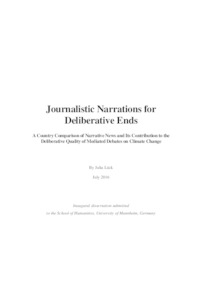|
Journalistic narrations for deliberative ends : a country comparison of narrative news and its contribution to the deliberative quality of mediated debates on climate change
Lück, Julia
![[img]](https://madoc.bib.uni-mannheim.de/45145/1.hassmallThumbnailVersion/Lueck%20Journalistic%20Narrations%20for%20Deliberative%20Ends.pdf)  Vorschau |
|
PDF
Lueck Journalistic Narrations for Deliberative Ends.pdf
- Veröffentlichte Version
Download (2MB)
|
|
URL:
|
https://madoc.bib.uni-mannheim.de/45145
|
|
URN:
|
urn:nbn:de:bsz:180-madoc-451452
|
|
Dokumenttyp:
|
Dissertation
|
|
Erscheinungsjahr:
|
2018
|
|
Ort der Veröffentlichung:
|
Mannheim
|
|
Hochschule:
|
Universität Mannheim
|
|
Gutachter:
|
Wessler, Hartmut
|
|
Datum der mündl. Prüfung:
|
16 Oktober 2017
|
|
Sprache der Veröffentlichung:
|
Englisch
|
|
Einrichtung:
|
Philosophische Fakultät > Medien- und Kommunikationswissenschaft (Wessler 2007-)
|
|
Fachgebiet:
|
070 Nachrichtenmedien, Journalismus, Verlagswesen
|
|
Normierte Schlagwörter (SWD):
|
Narrativität , Journalismus , Inhaltsanalyse , politische Berichterstattung , Klima , internationaler Vergleich
|
|
Freie Schlagwörter (Englisch):
|
Narrative journalism , mediated deliberation , deliberative quality , international comparative journalism research , quantitative content analysis , climate change , UN climate chance conferences , climate summit
|
|
Abstract:
|
The dissertation investigates journalistic news narrations. It aims at assessing their deliberative qualities by applying a quantitative instrument for a content analysis of newspapers that focuses comparatively on climate change coverage in Brazil, Germany, and the United States.
For this study, narrative news in the journalistic context is understood as a form of writing that differs from the conventional inverted pyramid style of traditional newspaper coverage by telling news stories in a sequential order, focusing on agents, their actions, and emotions as well as including additional details and hypothetical information. Narratives in a non-fictional media environment are a phenomenon about which the scholarly debate is ambiguous when it comes to an assessment of benefits and harms. Narratives in the context of so-called hard news have been evaluated differently, ranging from the negative assessments of intensified personalization and simplification to stressing the positive effects of increased accessibility to an issue and providing space for alternative and challenging interpretations.
Nevertheless, extensive theoretical considerations regarding journalistic narratives and their specific impact on public deliberation, especially within the mass media context and mediated deliberation, are rare. This study deals with this gap from a theoretical and empirical perspective. It aims at assessing narrative news coverage against the discussion of news quality in times of increasing economic constraints, by reviewing their deliberative performance. The investigations systematically look at the fulfillment of deliberative ideals such as the inclusion of actors and ideas on the input dimension of the public sphere, the occurrence of opposing arguments on the throughput dimension, and the openness or closure of the debate on the output dimension. Context knowledge about the journalistic cultures, historical developments of journalism, and the political and media systems of the three countries Brazil, Germany and the US is used to describe under which conditions narrative news is more likely to fulfill positive functions of public deliberation.
To investigate the deliberative quality of journalistic narratives in the coverage on climate change, a quantitative content analysis was conducted of German, Brazilian and US newspaper coverage on the UN climate change conferences of Cancun, Mexico (2010); Durban, South Africa (2011); Doha, Qatar (2012); and Warsaw, Poland (2013). The sample contains two widely read daily quality newspapers for each country. Narrative and deliberative elements were deduced theoretically for quantitative operationalization.
Results reveal that there is no general relationship between narrativity and the deliberative quality. There is no indication that narrative news writing is either good or bad in deliberative terms; it is rather context dependent. The results show that the newspaper coverage of all three countries differs in the use of narrative elements, the application of different story types, and in their general deliberative quality. While the Brazilian coverage generally has a high degree of narrativity and mainly uses story types that emphasize the urgency of climate change, it has a rather low deliberative quality. The opposite is the case for the US, which has a lower degree of narrativity, mainly using unexcited story types, and provides a higher deliberative quality. In both cases, narrative writing compared to non-narrative writing accounts for higher or lower deliberative quality only on some dimensions, but no consistent pattern was found. The picture is more diverse in Germany, with a less unambiguous use of narratives and story types, and a mixed deliberative quality. However, the relationship between higher narrativity and deliberative quality is most salient in this case.
|
 | Dieser Eintrag ist Teil der Universitätsbibliographie. |
 | Das Dokument wird vom Publikationsserver der Universitätsbibliothek Mannheim bereitgestellt. |
 Suche Autoren in Suche Autoren in
BASE:
Lück, Julia
Google Scholar:
Lück, Julia
Sie haben einen Fehler gefunden? Teilen Sie uns Ihren Korrekturwunsch bitte hier mit: E-Mail
Actions (login required)
 |
Eintrag anzeigen |
|
